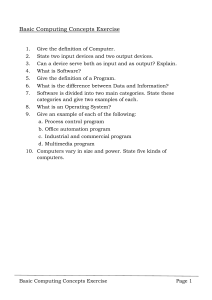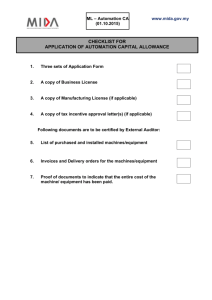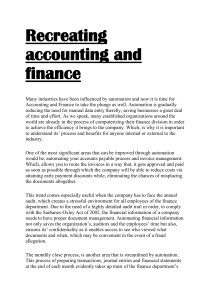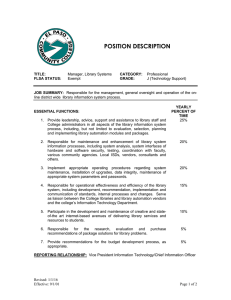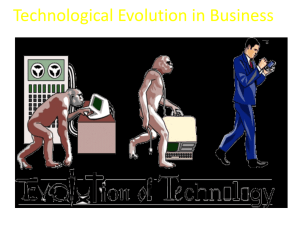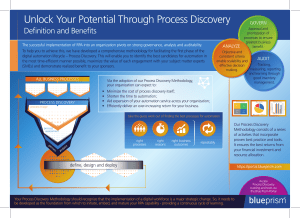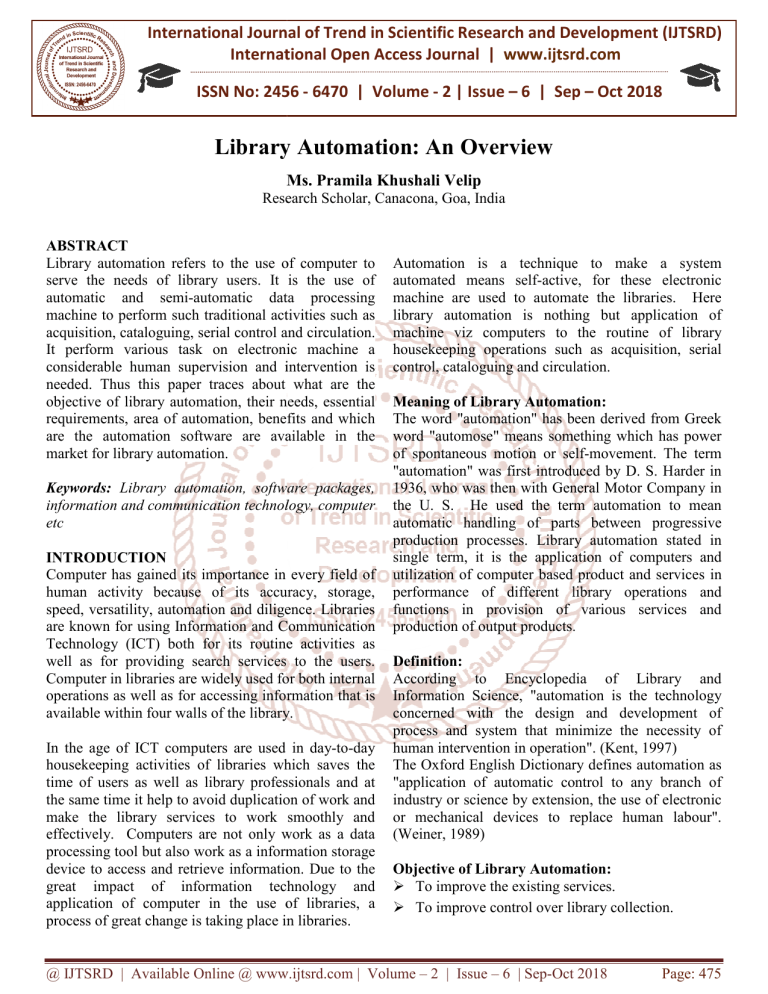
International Journal of Trend in Scientific Research and Development (IJTSRD) International Open Access Journal | www.ijtsrd.com ISSN No: 2456 - 6470 | Volume - 2 | Issue – 6 | Sep – Oct 2018 Library Automation: An Overview Ms. Pramila Khushali Velip Research Scholar Scholar, Canacona, Goa, India ABSTRACT Library automation refers to the use of computer to serve the needs of library users. It is the use of automatic and semi-automatic automatic data processing machine to perform such traditional activities such as acquisition, cataloguing, serial control and circulation. It perform various task on electronic machine a considerable human supervision and interve intervention is needed. Thus this paper traces about what are the objective of library automation, their needs, essential requirements, area of automation, benefits and which are the automation software are available in the market for library automation. Keywords: Library automation, software packages, information and communication technology, computer etc INTRODUCTION Computer has gained its importance in every field of human activity because of its accuracy, storage, speed, versatility, automation and diligence. Libraries are known for using Information and Communication Technology (ICT) both for its routine activities as well as for providing search services to the users. Computer in libraries are widely used for both internal operations as well as for accessing information that is available within four walls of the library. In the age of ICT computers are used in day-to-day housekeeping activities of libraries which saves the time of users as well as library professionals and at the same time it help to avoid duplication of work and make the library services to work smoothly and effectively. Computers are not only work as a data processing tool but also work as a information storage device to access and retrieve information. Due to the great impact of information technology and application of computer in the use of libraries, a process of great change is taking place ce in libraries. Automation is a technique to make a system automated means self-active, active, for these electronic machine are used to automate the libraries. Here library automation is nothing but application of machine viz computers to the routine of library libra housekeeping operations such as acquisition, serial control, cataloguing and circulation. Meaning off Library Automation: The word "automation" has been derived from Greek word "automose" means something which has power of spontaneous motion or self-movement. self The term "automation" was first introduced by D. S. Harder in 1936, who was then with General Motor Company in the U. S. He used the term automation to mean automatic handling of parts between progressive production processes. Library automation stated st in single term, it is the application of computers and utilization of computer based product and services in performance of different library operations and functions in provision of various services and production of output products. Definition: According ording to Encyclopedia of Library and Information Science, "automation is the technology concerned with the design and development of process and system that minimize the necessity of human intervention in operation". (Kent, 1997) The Oxford English Dictionary nary defines automation as "application of automatic control to any branch of industry or science by extension, the use of electronic or mechanical devices to replace human labour". (Weiner, 1989) Objective off Library Automation: To improve the existing services. ervices. To improve control over library collection. @ IJTSRD | Available Online @ www.ijtsrd.com | Volume – 2 | Issue – 6 | Sep-Oct Oct 2018 Page: 475 International Journal of Trend in Scientific Research and Development (IJTSRD) ISSN: 2456-6470 2456 To have an effective control over the entire library operation. To avoid duplication of work. To share resources effectively though consortia amount various libraries. To improve the level of services and quality of output. To maintain bibliographical records of all the materials in a computerized form. To reduce repetition in the technical processing of housekeeping operations. To provide online catalogue. To access other ther network on the web. To provide access to information at a faster rate. To implement new IT processes to provide high quality information. Need of Library Automation: The use of computer has changed the whole structure and working environment of the library. In the present day context automation of library is needed because To improve the quality, speed and effectiveness of services. To obtain increased operational efficiency. ficiency. Information exlposition. To improve access the resources on other network and system including the web. To facilitate a wider dissemination of their information products and services. To enable their participation in resource resource-sharing with other libraries. To improve the management of their physical and financial resources. Availability of information in various formats (print, non-print, graphical, audio-visual, visual, etc. Limitation of library (time, space and man power). Duplication of housekeeping activities. To search national and international databases. Essential for Library Automation: The essential things for the automation of a library are as follows 1. A good collection: Computerisation is not just for the sake of Computerisation. Computerisation of any library collection and their services is to serve the users better and to provide access to information. For this purpose, first of all the collection of library should be good and comprehensive. The library should have a book acquisition policy and norms for the building up of a good collection. 2. Finance: Finance required in automation of library for the collection building, computer system and recurring expenditure, etc. For any programme finance is the important component. The finance of any automation programme includes both installation and ongoing expenditures which includes maintenance, stationeries etc. 3. Suitable computer hardware: Selection and purchase hase of a computer is a complex procedure. The library should decide first what type of computer is suitable for its work. There are variety of computer and computer makers. There are minimini frame computer to main frame computer. The library should decide to o purchase best quality of computer hardware to automation their library. 4. User friendly computer software: Computer software is generally expensive. Software will include Utilities format, conversion programmes. Application software. Database management system and data dictionary software. Dated communication software. Programming aids, testing aids, etc. Additional system software. 5. Staff training: Training is required to the library staff in using each and every module of the library automation software. softwar Training session to be conducted in regular intervals and wherever library automation software is updated. 6. User training. Not only the library staffs need to get training, but also user should be provided training either by library staff or any other training institution. For smooth functioning and maximum utilization of library resources the user should be provided training at regular intervals. Areas of Library Automation: Acquisition system:- Automates the acquisition process, ordering, receiving, claiming materials from suppliers and return and cancellations of materials. Acquisition can be done online if system is linked to an external network. Cataloguing system:- Creation, storage, retrieval and management of bibliographical records and indexes. Circulation:- To handle circulation activities such as lending, return, renewal and place on hold. Serial control:- Manages placing, canceling, canceling claiming of orders, returning defective, unwanted @ IJTSRD | Available Online @ www.ijtsrd.com | Volume – 2 | Issue – 6 | Sep-Oct Oct 2018 Page: 476 International Journal of Trend in Scientific Research and Development (IJTSRD) ISSN: 2456-6470 2456 and unordered material and accounting and statistical information. Inter - library loan via OPAC:-- Provide staff with an information management system for inter library loan transactions. This includes automatic monitoring of loans and accounts, making claims. Putting holds on materials being borrowed, etc. Some library software packages and their developing agencies: Sr. Software Developing Agency No. Packages 1 CDS/ISIS UNESCO, Paris Libsys Corporation, New 2 Libsys Delhi INFLIBNET Centre, 3 ILMS Ahemadabad MINIFAX Electronics 4 Archives Pvt. Ltd, Bombay Datapro Consultancy 5 Libman Services, Pune 6 Librarian Soft - Aid, Pune Frontier Information 7 Libris Technologies Pvt. Ltd. , Trivandrum Memos Pvt. Ltd., 8 Memlib Ahemadabad 9 Soul INFLIBNET Centre, Ah Ahm 10 Granthalaya NISCAIR, New Delhi 11 Sanjay DESIDOC, New Delhi Kesavan Institute of 12 New Genlib Information and Knowledge Management 13 Wilisys WIPRO India, Bangalore PROBLEM OF LIBRARY AUTOMATION: Lack of motivation towards latest information technology. Lack of organization effort towards library. Lack of funds. Lack of trained personnel. Lack of standard technology. Ignorance of senior library staff about the technology. Selection of appropriate software packages. Advantages of Library Automation: Library automation has the following advantages. Accuracy: - The degree of precision and accuracy in processing information is high. However However, it is dependent on thee accuracy of information led into the system. Speed:- Information processing is done much faster which ensure better work flow through the library. Improved services to users:users: High rate and better quality on performance is possible through the use of computer. Reduction in library workloads:workloads: Library workload can be reduced as the computer can do vast amount of work and processing. Cost effectiveness:- Operating costs can be reduced if the system is well designed and well managed. • Eliminates human error or while performing routine library work. • Easier access to external databases. • Eliminates duplication of work. • Providing online access and search of information. • Excellent control over circulation. Disadvantages of Library Automation: Security problems. Financial expenses. Totally depend on electricity. Maintenance of automation software is totally depend on computer administration. Untrained users. Conclusion: The main aim of any library is to provide access for correct information, to a right user at a right time. So keeping in view to serve the better services for user automating a library is must. Library automation is the process which needs proper planning, timely implementation and periodical evaluation. For automation of any library, ibrary, a selection of suitable software package is needed which is user friendly. At the same time training should be given to a library staff as well as library user. Bibliography 1. (n.d.). Retrieved 09 15, 2018, from http://www.clib.dauniv.ac.in/Electure/Library%20 http://www.clib.dauniv.ac.in/E Automation.pdf 2. (n.d.). Retrieved 09 15, 2018, from http://librarykvpattom.wordpress.com/2007/12/27/ library-automationaims-and and-objectives/Retrieved 2018 3. (n.d.). Retrieved 09 16, 2018, from http://ismblogblog.wordpress.com.2016/05/09/libr ary-automation/Kent, automation/Kent, A. (1997). Encyclopedia of Library and Information Science. Marcel Dekkar,New York. Weiner, S. &. (1989). Oxford English Dictionary . Oxford: Clarendon Press. @ IJTSRD | Available Online @ www.ijtsrd.com | Volume – 2 | Issue – 6 | Sep-Oct Oct 2018 Page: 477
